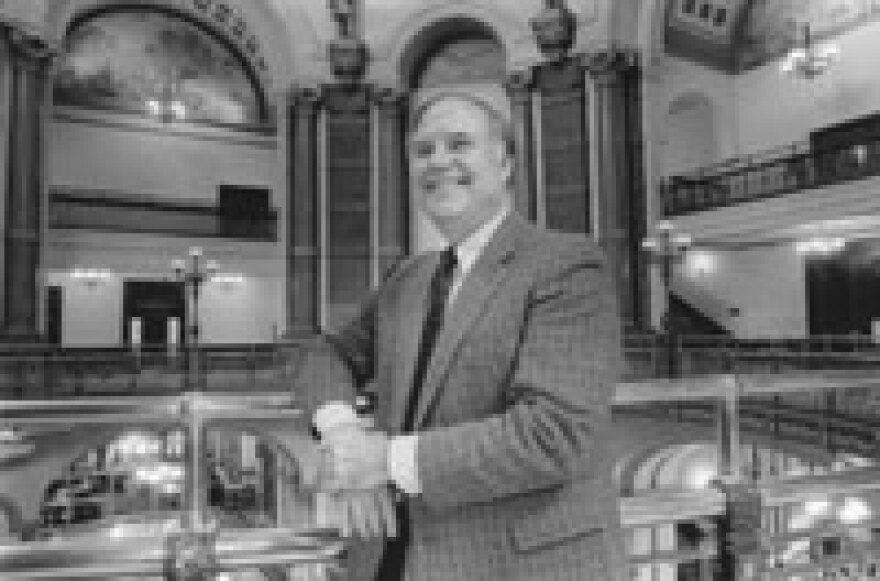In the Chicago area, two of the season’s most beloved traditions are the Apollo Chorus’ performance of Handel’s Messiah at Orchestra Hall and the Joffrey Ballet’s presentation of Tchaikovsky’s Nutcracker at the Auditorium Theatre. Both classics are performed by other artists elsewhere across the state, of course, including here in Springfield.
But in a few days, the Capital City will witness a biennial holiday rite all its own — folks lining up outside the state Board of Elections office to file nominating petitions for the March 16 primary for Congress, the Illinois General Assembly, the state judiciary and a host of local offices. A month later, another bunch will be there, this time hoping to win berths on March 16 for trips to the two major parties’ national presidential nominating conventions.
For all the holiday hubbub, however, political junkies might find the upcoming primary disappointing in several respects.
Consider the presidential voting. That Republicans will renominate President George W. Bush is a foregone conclusion; all that’s likely to be at stake for GOP voters is which of their neighbors will get to root for Bush in New York next August.
On the Democratic side, nine major candidates are vying for that party’s nomination, and each no doubt is hoping that Santa Claus will bring the dose of magic needed to break out of the pack in Iowa and New Hampshire. By the time Illinois Democrats get to vote for delegates pledged to their presidential choices, however, odds are overwhelming the party nominee will have been anointed.
The Grinch that is stealing any national relevance from this state’s primary is a delegate selection process that appears designed to pick a nominee as quickly as possible.
After the traditional kickoff by the Iowa caucuses and the New Hampshire primary in January, 17 states and the District of Columbia will select Democratic delegates in February. Eleven others, including such mega-delegate states as California (440), New York (284) and Texas (232), will choose on March 2. Indeed, by the time Illinoisans go to the polls, a total of 34 states, plus D.C. and American Samoa, will have picked 3,118 delegates — almost three-quarters of the 4,317 total — more than four months before Democrats gather in Boston the last week in July.
With the Illinois primary thus very much an afterthought, about the best chance an Illinois Democrat has of seeing most of the party’s White House hopefuls is on C-SPAN.
Closer to home, party nominations for 22 Illinois Senate seats and all 118 House spots also will be at stake on March 16. Again, however, experience suggests that voters shouldn’t look for much excitement on the legislative front. In 2002 — a year in which new district boundaries might have been expected to entice newcomers to the fray — only 10 Democratic and nine Republican Senate nominations were challenged, roughly 16 percent. Competition was not much better in the House, where just 23 Democratic and 22 Republican slots were competitive, about 19 percent.
Only two House districts — the north suburban 57th and the Rockford-based 67th — saw primary contests in both parties. In fact, partisans in most legislative districts had no one from their camp on the primary ballot — in 42 Senate and 65 House districts, only one party’s hopeful filed.
But the primary hardly is a total bust for those seeking spirited partisan battles, thanks to U.S. Sen. Peter Fitzgerald. The Inverness Republican’s decision not to seek a second term inspired a plethora of would-be successors, which public opinion polls suggest voters are still trying to sort out.
A Chicago Tribune poll in late October indicated that 45 percent of Democratic voters and 59 percent of Republicans were undecided.
A Fox News poll a month earlier found similar results, with half the Democrats and 45 percent of the Republicans saying they didn’t know whom they would choose.
Only one of the crowded field has won statewide, Democrat Dan Hynes, twice elected state comptroller. Several other Democrats have electoral experience, including Cook County Treasurer Maria Pappas and state Sen. Barack Obama of Chicago, and attorney Gery Chico, who is a former president of the Chicago Board of Education. Perhaps the most interesting Democratic hopeful is M. Blair Hull, an options trader who’s said he’s willing to spend $40 million of his own money for the Senate seat. Also in the chase are radio personality Nancy Skinner and health care executive Joyce Washington.
While none of the Republican hopefuls has pledged to match Hull’s outlay, there’s no dearth of millionaires in the GOP field, though, like Hull, none of them have previous elected experience. The list includes Jack Ryan, a former investment broker and teacher in an all-black, boys’ Catholic high school on Chicago’s South Side; Andrew McKenna Jr., president of a Morton Grove paper company; James Oberweis, an Aurora dairy owner and investment manager who spent $1 million in a losing bid for the GOP Senate nomination in 2002, and Chirinjeev Kathuria, an Oak Brook entrepreneur.
Other GOP hopefuls include retired U.S. Air Force Major General John L. Borling of Rockford, former state Rep. Jonathan Wright of Hartsburg and state Sen. Steve Rauschenberger of Elgin. Although a self-described “hundredaire,” Rauschenberger is no stranger to boxcar numbers; indeed, he’s arguably the lawmaker who is most knowledgeable about the state’s $50-billion-plus budget.
While the cast may change a bit before March, the Senate races still figure to make Primary 2004 a lively adventure, no matter that the presidential parade will have passed Illinois by.
Charles N. Wheeler III is director of the Public Affairs Reporting program at the University of Illinois at Springfield.
Illinois Issues, December 2003






